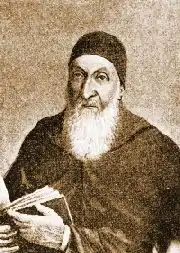Mikayel Chamchian
Mikayel Chamchian (Armenian: Միքայէլ Չամչեան, 4 December 1738 – 30 November 1823), known also in English as Michael Chamich, was an Armenian Mekhitarist monk and historian. He is best known for writing a comprehensive and influential history of Armenia in three volumes, which has remained a starting point of reference for scholars since the time of its publication.

Career
Chamchian was born in Istanbul and trained as a jeweler by the imperial jeweler Mikayel Chelebi Duzian. He joined the Mkhitarian Congregation in Venice in 1762.
In 1774 he was appointed instructor of Armenian language in the monastery. In 1779 he wrote Kerakanutiun Haykazian Lezvi (Քերականութիւն Հայկազեան լեզուի, Grammar of the Armenian Language). By 1784 he had finished his Patmutiwn Hayots i Skzbane Ashkharhi Minchev tsam diarn (Պատմութիւն Հայոց; Armenian history from the beginning of the world to the year 1784). The work marks the beginning of Romantic Armenian nationalism.
Chamchian provided a chronology for the Armenian patriarchs (as laid down by Movses Khorenatsi in his History of Armenia), dating Hayk's battle with Belus, and thus the formation of the Armenian people, to August 11, 2492 BC. He is also the source for the traditionally accepted date for the foundation of official Christiandom in Armenia as AD 301.[1]
In 1795 he was sent back to Constantinople as the resident Mekhitarian representative.
References
- Panossian, Razmik (2006). The Armenians: From Kings and Priests to Merchants and Commissars. New York: Columbia University Press. p. 106. ISBN 9780231511339.
Sources
- Utudjian, A. A. (1988). "Միքայել Չամչյան (կյանքի և գործունեության համառոտ ուրվագիծ) [Mikayel Chamchian (A Brief Outline of his Life and Activities)]". Lraber Hasarakakan Gitutyunneri (in Armenian). Yerevan: Armenian Academy of Sciences (9): 71–85. ISSN 0320-8117.